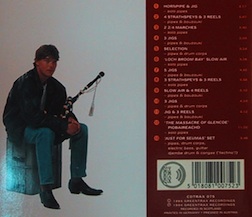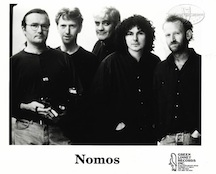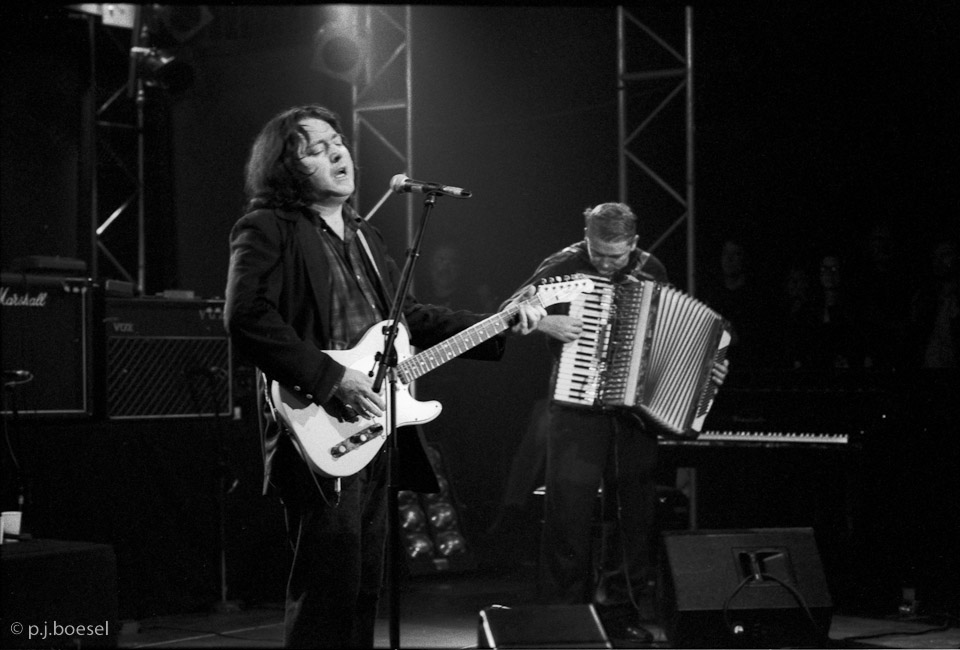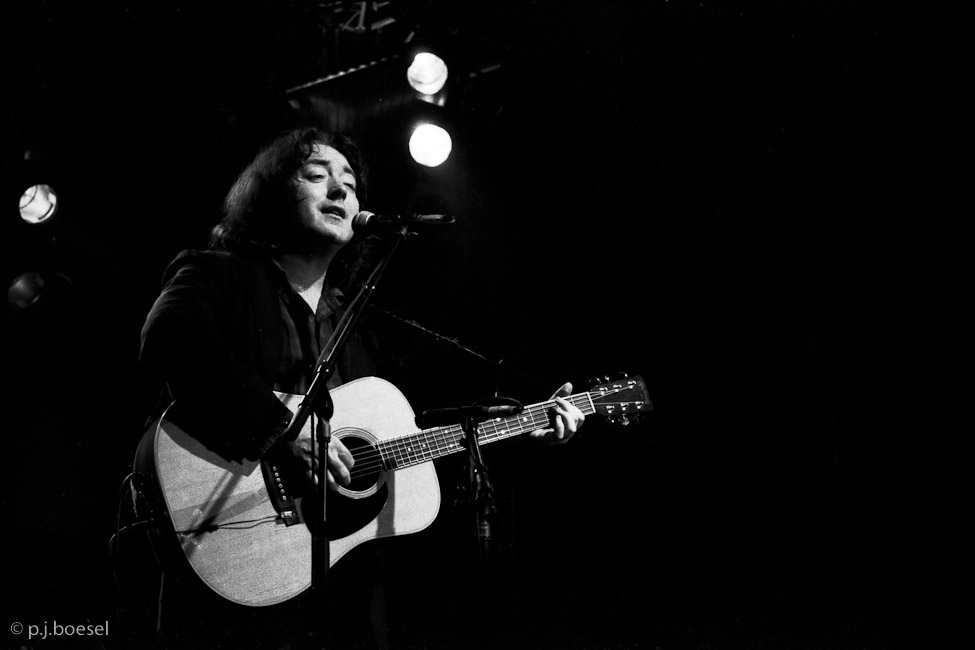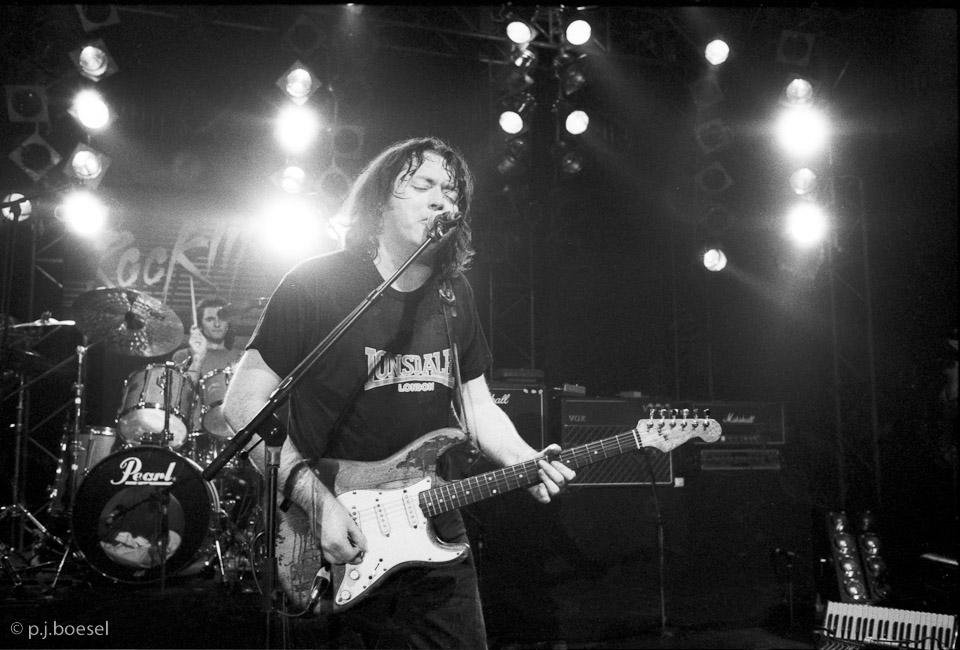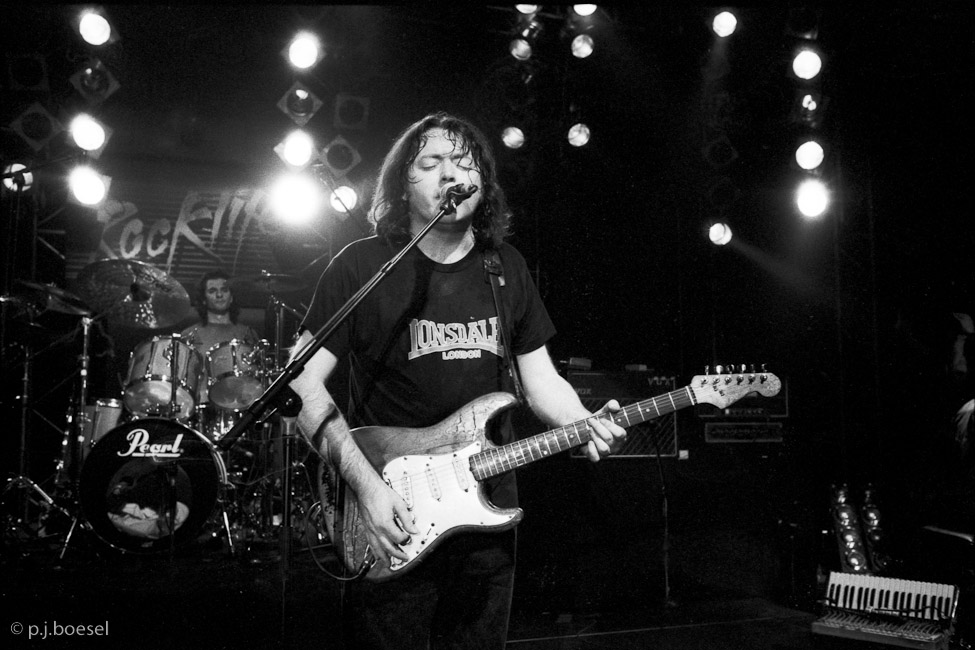Feb 11 2013
Rory Gallagher’s Jig
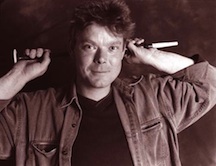
On December 14, 2005, the world lost an incredibly talented musician. Gordon Duncan died at the age of 41, but in his short life he helped breathe “new life into traditional musical form.” He composed over a hundred tunes, with perhaps his most famous composition, “Andy Renwick’s Ferret,” being recorded over 100 times around the world and on almost every conceivable instrument. He had the most amazing fast fingers and it was that combination of a great tune-smith, incredible feel, and innovative playing that elevated his status to that of legend. If the name is unfamiliar to you, you are not alone. Traditional musicians get short shrift in the music industry. Gordon Duncan never graced the cover of Rolling Stone — but he should have. He didn’t play the electric guitar. He didn’t bang the drums or plunk the keys. Gordon Duncan was a piper — a bagpiper, and he was the closest thing to a rock star the piping world has ever known.
Gordon was widely regarded as one of the most skilled and innovative traditional performers and composers of modern times. While steeped in the art of traditional highland piping, his approach to his music was always imaginative, fresh and at times radical, to the extent that his influence can be heard within an entire generation of younger musicians across Scotland and well beyond. — Gary West, BBC Radio Scotland
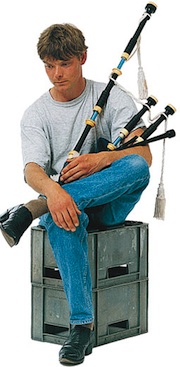
Raised in Pitlochry, Gordon came from a long line of Scottish pipers and was a successful competitor on the junior scene. His time with the Vale of Atholl pipe band changed and evolved the music and medleys of pipe bands throughout the land. “The Vale of Atholl were the innovators and before their time in pipe band music. They were often criticized by the traditional judges for being too adventurous in their tune selection,” asserts noted piper Stuart Cassells, but years later it’s Gordon’s tunes or his unique arrangements of traditional tunes that are the predominately performed selections in the competitions.
In the early eighties Gordon moved on to the folk scene, playing sessions with many of the leading bands of the day, including the Tannahill Weavers, Capercaillie, Ceolbeg, and Wolfstone. He continued to compete in the piping competitions however, and his unorthodox interpretations of traditional tunes and his bridging of folk with traditional Scottish piping caused considerable consternation to the more rigid, elitist thinking old guard of the piping community. This came to a head in the famous 1993 piping knockout competition held in BBC Studio 1 in Glasgow. After hearing Gordon play, renowned piping judge and co-founder of the Glasgow College of Piping, Seumas MacNiel infamously said “If that’s what piping’s about today, I’m taking up the fiddle”.
A year later, Gordon would craft his reply to Seamus MacNiel in the form of his first commercially released album, Just for Seumas. A review of the album for the Clan Currie Society heralded the album as a tour de force in modern day piping: “It displayed the full range of Duncan’s mastery of piping, opening with a tune from Seumas MacNiell’s own collection of music, through traditional competition material, piobaireachd and music arranged with snare drum, guitar and bouzouki accompaniment, to the memorable closing track consisting of a heavy dance beat accompanying Duncan’s playing. This track also included what was then seen as sacrilege – the first line of the piobaireachd Lament for Mary MacLeod was used as a harmony line for a reel.” Just for Seumas proved a fitting response to the piping judge’s disparaging remark!
For the most part Just for Seumas was filled with unique takes on long forgotten tunes, but also included several of Duncan’s own compositional gems, one of them being a tune called Rory Gallagher’s Jig, named after one of Gordon’s musical heroes. In recent years it has become quite a popular tune in Scotland, Ireland, and even across the waters in America where it was until recently part of the repertoire of Kansas City’s St. Andrew Pipes and Drums.
Gordon loved his music. Indeed he said he gained inspiration for composing when listening to Rory’s music (loud). — Ian Duncan, Gordon’s brother
Rory Gallagher’s Jig — by Gordon Duncan
The tune was quickly picked up by the Irish traditional band, Nomos, whose ranks included noted singer/songwriter John Spillane on guitar and bass, Vince Milne on fiddle, Gerry McKee on bouzouki, Frank Torpey on bodhran, and Niall Vallely on concertina. The Cork based group had previously recorded a cover of Gordon’s tune ‘Andy Renwick’s Ferret’ on their first album, I Won’t Be Afraid Anymore and now included Gordon’s Rory Gallagher’s Jig on their second album, Set You Free.
I had known Gordon Duncan for a while and learnt the tune from his Just for Seamus album. We had recorded one of Gordon’s tunes called “Andy Renwick’s Ferret” on our first album and I had subsequently met Gordon a few times. He wouldn’t have been that well known in Ireland back then, but I was very interested in Scottish music as well and had been learning quite a lot of bagpipe music at the time. The fact that the tune was called “Rory Gallagher’s Jig” was somewhat coincidental – I’m not sure I had seen the title when I heard the tune first – but then it did feel good to make the connection. John was certainly a big fan of Rory’s and I’d say a couple of the other lads would have been as well. Most people in Cork seem to feel some connection to Rory anyway! — Niall Vallely
Rory Gallagher’s Jig — performed by Nomos
In 2009, Scottish flatpicker John Carnie became the first to translate the jig to guitar, performing the tune to thunderous applause at the annual U.K Rory Gallagher tribute at the Cavern Club in Liverpool. Probably the first time a bagpipe tune was ever played in the Cavern! He included the jig in his first acoustic album, Far From Home. “It is the first album of its type to feature entirely Scottish material on flatpicking acoustic guitar and covers the entire spectrum of Scottish fiddle and traditional tunes, adding a jazzy and bluesy twist to many of the compositions.” — Ross Macfadyen, Celtic Music Radio
I got into blues pretty early on. I was lucky to go to a Rory Gallagher concert when I was 12. I was only allowed to go because it was a Sunday afternoon 4pm show as the evening show in Edinburgh had sold out! His acoustic playing also struck me as well as the electric stuff…
I was the first to translate Rory Gallagher’s Jig to guitar and Dave Moir and myself also put a very short acoustic slide number called Edinburgh City Blue at the very start of the tune to pick up on the Rory blues influence. We also included blues harmonica and jazz double bass on the track to help it rock out a bit…I have just written the first ever tutor book for Scottish tunes on the guitar and I was extremely fortunate to get permission to put Rory Gallagher’s jig in the book. — John Carnie
Rory Gallagher’s Jig — performed by John Carnie
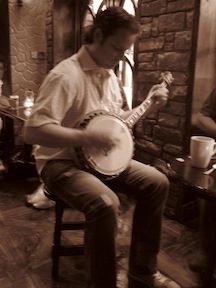
In 2011, Award winning Kerry banjo man, Brian Friel released his debut album, Karusell. A previous winner of All-Ireland titles on the banjo and mandolin alike at the Fleadh Cheoil Eireann, Ireland’s biggest and most prestigious annual competition for musicians, Brian’s debut album features mainly Irish material with a taste of Swedish folk in the mix.
“It’s a collection of old tunes I grew up with and some Swedish folk in there too — fused together with Irish Trad.”– Brian Friel
The Album was recorded in Stockholm by Kieran O Loughlin from Sixmilebridge, Co Clare in 2011 and launched at St Johns Theatre and Arts Centre Listowel, Co Kerry.
“Karusell is a highly enjoyable album, solid playing and great tunes,” notes reviewer Alex Monaghan of Living Tradition. Of interest to Rory Gallagher fans is the inclusion in the album of, as Alex puts it, “a driving version of Gordon Duncan’s ‘Rory Gallagher’s Jig’.”
There will only ever be one Gordon Duncan. The man was a pure genius. — Brian Friel
Rory Gallagher’s Jig — performed by Brian Friel
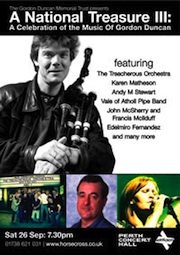
In 2007, The Gordon Duncan Memorial Trust was set up by a group of family members and friends, with the purpose of promoting piping and other forms of traditional music in Scotland, with a particular emphasis on young musicians. On Saturday 29th September 2007, the Trust presented a Concert in the Perth Concert Hall to raise funds for the Trust. The concert was an unqualified success with the capacity audience being treated to a galaxy of talent from the piping and traditional music scenes, gathered together in Gordon’s native Perthshire to celebrate his music, his influence and immense contribution to Scotland’s musical landscape. The annual event continues on to this day.
- And in the past couple of years BBC Alba has aired two programs on Gordon Duncan:
- Dha Gordon a-mhain (Just for Gordon) a documentary about Gordon’s life, and his tunes which became a mainstay of the Scottish traditional music repertoire
- Cuirm-Ciuil dha Gordon Duncan (A National Treasure) which included feature performances from the fourth concert held in Gordon’s memory, in Perth in 2010
Famed Scottish musician and bagpipe maker Hamish Moore once said of Gordon Duncan: “This man is precious and should be one of Scotland’s national treasures.” – no truer words were ever spoken. Like the Rory Gallagher he idolized, Gordon Duncan is a true legend, the likes of which we’ll never see again in our lifetime. To learn more about Gordon Duncan please visit the Gordon Duncan Memorial Trust.
